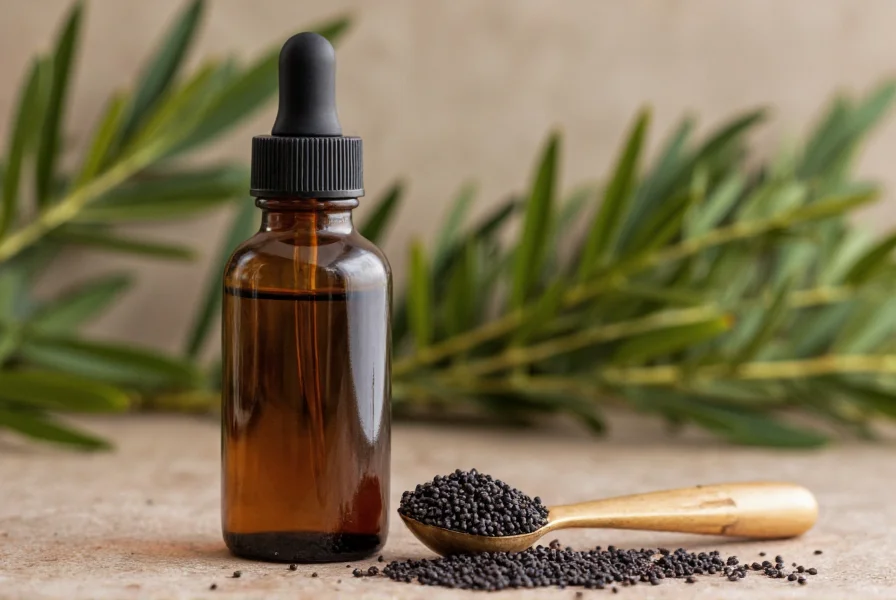Black cumin seed oil, derived from Nigella sativa seeds, has been used for centuries across various cultures. Understanding proper application methods ensures you maximize its potential while maintaining safety. This comprehensive guide details evidence-based usage techniques without making unsubstantiated health claims.
Understanding Black Cumin Seed Oil Basics
Black cumin seed oil, also known as nigella sativa oil or kalonji oil, contains thymoquinone as its primary active compound. The oil typically appears dark yellow to amber and has a distinctive nutty aroma with slight peppery notes. It's available in three main forms:
| Form | Best For | Shelf Life |
|---|---|---|
| Cold-pressed oil | Topical application, cooking | 12-18 months |
| Seeds | Grinding for cooking, tea | 2-3 years |
| Capsules | Internal consumption | Check expiration date |
Safety First: Essential Precautions
Before exploring how to use black cumin seed oil, understand these critical safety considerations. This information addresses common concerns about black cumin seed oil safety guidelines that many beginners overlook.
Consult your healthcare provider before use if you:
- Take blood pressure medications
- Use diabetes medications
- Are pregnant or breastfeeding
- Have upcoming surgery within two weeks
- Experience autoimmune conditions
Always perform a patch test before topical application by applying a diluted drop to your inner forearm. Wait 24 hours to check for reactions. Never apply undiluted oil directly to skin—this addresses frequent questions about black cumin seed oil topical application safety.

Internal Consumption Methods
For those researching proper dosage of black cumin seed oil, start with conservative amounts. Most experts recommend:
- Beginner dose: 1/4 to 1/2 teaspoon daily for first week
- Maintenance dose: 1-2 teaspoons daily, preferably with food
- Maximum daily amount: Do not exceed 3 teaspoons
Mix the oil with honey, warm water, or add to smoothies to improve palatability. Some people prefer taking it in capsule form for consistent dosing. Remember that individual tolerance varies significantly when determining how to use black cumin seed oil internally.
Topical Application Techniques
For skin and hair applications, proper dilution is essential. The recommended dilution ratio is 1 part black cumin seed oil to 3 parts carrier oil (like coconut, jojoba, or almond oil). This addresses common concerns in searches for how to use black cumin seed oil for skin.
Effective topical usage methods include:
- Facial serum: 2-3 drops diluted oil applied to clean skin
- Scalp treatment: Massage diluted oil into scalp before washing
- Spot treatment: Apply diluted oil directly to targeted areas
- Body moisturizer: Add 5-10 drops to your regular moisturizer
For therapeutic massage, increase concentration to 1:1 with carrier oil, but never exceed 50% concentration for direct skin application.
Culinary Integration
Understanding using black cumin seed oil in cooking requires attention to temperature sensitivity. The oil's beneficial compounds degrade above 320°F (160°C), so avoid high-heat cooking methods.
Best culinary applications:
- Add to finished dishes just before serving
- Use in salad dressings (combine with lemon juice and olive oil)
- Mix into hummus or yogurt dips
- Drizzle over roasted vegetables
- Add to bread dough before baking
For traditional cooking with seeds rather than oil, toast whole nigella seeds lightly before use to enhance flavor. This addresses queries about black cumin seed oil versus seeds in culinary contexts.

Storage and Quality Considerations
Proper storage directly impacts how to store black cumin seed oil effectively. Follow these guidelines:
- Store in dark glass bottles away from light
- Keep in cool place (below 70°F/21°C)
- Ensure tight-sealing cap to prevent oxidation
- Refrigeration extends shelf life significantly
- Check for rancidity by smell (should be nutty, not sour)
When purchasing, look for cold-pressed, organic, and third-party tested products. The oil should be stored in opaque containers to protect from light degradation—a crucial detail often missing from basic guides on how to use black cumin seed oil properly.
Common Usage Mistakes to Avoid
Many beginners make these errors when learning how to use black cumin seed oil safely:
- Starting with too high a dose internally
- Applying undiluted oil directly to skin
- Using expired or improperly stored oil
- Expecting immediate results from topical application
- Mixing with incompatible medications without consultation
Remember that consistency matters more than quantity. Regular, moderate use typically yields better results than occasional high-dose applications when following proper black cumin seed oil application methods.
Frequently Asked Questions
Can I apply black cumin seed oil directly to my face?
No, you should never apply undiluted black cumin seed oil directly to your face. Always dilute it with a carrier oil at a minimum 1:3 ratio (one part black cumin seed oil to three parts carrier oil). Perform a patch test 24 hours before full facial application to check for sensitivity.
What's the recommended daily dosage for internal use?
Start with 1/4 to 1/2 teaspoon daily for the first week, then gradually increase to 1-2 teaspoons daily if well tolerated. Never exceed 3 teaspoons per day. Always take with food to minimize potential digestive discomfort and consult your healthcare provider before beginning regular consumption.
How should I store black cumin seed oil to maintain quality?
Store black cumin seed oil in a dark glass bottle away from light and heat. Keep it in a cool place below 70°F (21°C), preferably in the refrigerator after opening. Ensure the cap seals tightly to prevent oxidation. Properly stored oil typically maintains quality for 12-18 months.
Can I use black cumin seed oil for hair growth?
While some traditional practices include black cumin seed oil in hair care routines, scientific evidence for hair growth specifically is limited. You can safely incorporate it into your hair care by mixing 5-10 drops with your regular carrier oil and massaging into the scalp, but manage expectations and understand that results vary significantly between individuals.
Is black cumin seed oil safe to use during pregnancy?
No, black cumin seed oil is generally not recommended during pregnancy without explicit approval from your healthcare provider. The oil may stimulate uterine activity, potentially causing complications. Always consult your obstetrician or midwife before using any herbal products during pregnancy or breastfeeding.










 浙公网安备
33010002000092号
浙公网安备
33010002000092号 浙B2-20120091-4
浙B2-20120091-4